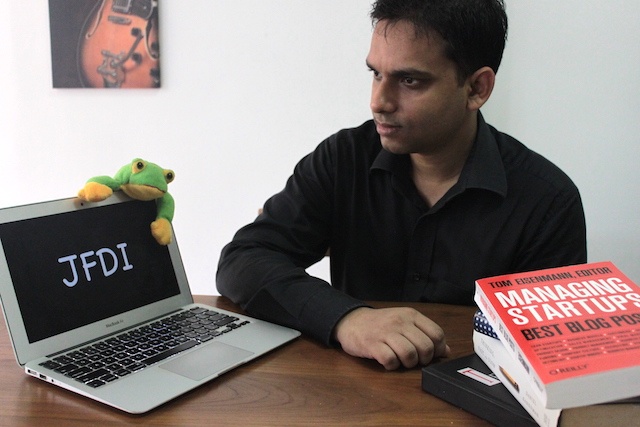In the last few years, JFDI Mentor Sangeet Paul Choudary has helped scores of our startups to understand the dynamics of their multi-sided market ‘platform’ businesses. This week he’s offering free downloads of his new book, writes Crystal Neri

Sangeet Paul Choudary is a researcher pioneering understanding of ‘platform business models
Back in January 2013, a few months into starting his blog, Sangeet Paul Choudary found a comment from a reader, “You’re looking at and writing about a thing not properly understood in Asia. If there was someone who understood it extremely deeply, it would be Meng Wong.”
So Sangeet reached out to Meng, co-founder at JFDI.Asia and the two shared many deep conversations as Choudary worked to put together a new theory of business in multi-sided markets, informed by the experience of JFDI’s startups. Sangeet became a mentor on JFDI’s Accelerate Program “because it has a good filter and the quality of startups was high. I got intrigued, because I know that earlier you look at the startup life cycle, the more difficult it is to separate the noise.”
Sangeet describes himself as a ‘pattern finder’, working with platform business models, marketplaces and networks and understanding how they disrupt different industries. His journey of discovery began in 2010, when he was Head of Innovation at Intuit.
“We got into a discussion about Lean Startup. And while I really appreciate what was being talked about in that discussion, a lot of it was just on the focus on ‘how’ you manage innovation. What was not being discussed were how fundamentally business models are changing and the fact that simply changing the ‘how’ would not change outcomes, unless you understood the new business models that are emerging,” Sangeet says.
After initially looking for patterns in failed business ventures, he transitioned to a new area of study – how business platforms work. Today Choudary wears many hats: researcher, speaker, author, CEO and founder of Platform Thinking Labs. He’s also doing implementation and advisory to a wide range of global businesses, from Fortune 100 companies to early-stage startups like JFDI Accelerate.
Rewards and Challenges of Mentoring at JFDI
“We don’t have an official ‘Guru in Residence’ at JFDI but if we did it would be Sangeet,” says CEO Hugh Mason about the value Choudary brings to the accelerator. “So many of our startups are working in multi-sided markets where the economics are different to traditional companies and it’s not always clear who is a supplier and who is a customer. These kinds of questions and the practical ones, like how to get enough people on both sides to get it going, are issues that Sangeet has thought about harder than anyone I know.”
Choudary enjoys seeing the passion of startups at JFDI. He knows the founders are not just doing startups because it’s the cool thing to do, but because they are serious about solving problems. He finds the hardest part of being a mentor is recognizing boundaries and knowing how and when to complement a founder: “This is where most advisors get it wrong – when they create a worldview of what the startup should be doing, instead of understanding the kinds of challenges the founder is facing, and solving it within that context.”
Multiple Currencies, Systems Thinking and Failure
When asked about the most common advice he gives to founders, Choudary deconstructs the question.
“There are two types of mentors. The first type are generalists – people who don’t specialize in a topic but speak from similar life experiences of running a startup. The second type are specialists – people who understand certain things very well. That’s what I consider myself; I give specialized advice on how to design, launch and manage platform business models. The most important thing is that founders know this difference in terms of understanding exactly what kind of mentorship they’re looking for.”
From his own journey, Choudary shares the following key lessons he’s learned along the way:
1. Measure what you do in multiple currencies
Most people think that everything should be measured in terms of money, but Choudary measures what he does in terms of multiple metrics, such as terms of impact, influence, and credibility. He says, “Whatever it is that you do, it’s important to identify what currencies you value and then optimize what you’re doing for all of these currencies rather than just for earning and maximizing the money that you want to make.” This is especially true when you’re building something for the long run.
2. Create your own systems
All our lives – from home, to schools, to the workplace – we have been conditioned to follow a set of rules created by someone else. If you’re doing something that is not within a system of external constraints, like entrepreneurship, creative work, or inventing something, then you have to build your own systems. It’s probably the most difficult part, but it’s the biggest and most important discipline that comes when you need to do something on your own.
3. Instead of goals think ‘learning systems’
Inspired by ‘Dilbert’ creator Scott Adams, Choudary makes a distinction: “I don’t operate on success versus failure thinking because those come to mind only when you think of goals, a defined outcome within a defined timeline. Instead, a learning system has more operational measures in terms of what things you’re learning and how you’re becoming better at what you do. There have been many outcomes in my journey which one would consider remarkable successes, or outcomes that did not work out as well, but all through, I focus on figuring out if the systems that I’ve created are constantly learning and becoming more efficient.”
On Books And The Future
Choudary aims to continue his work with how institutions get transformed by the Internet. He just penned two books: one just had a successful launch as #1 best selling in Amazon, and the other is coming out next year (get a free copy here until the October 9th.) The former is entitled Platform Scale, targeted for startups as a maker’s manual for building a successful platform business. He explains, “Connectivity will be an important theme in the next few years. I’m really looking forward to taking the whole idea of how platforms are changing the world to a level where it’s just not Silicon Valley or a few companies are talking about it, but a place where all companies understand that platform thinking is an important function today.”

 Crystal Neri writes content and handles social media at JFDI Asia. Say Hi to her on Twitter, @nericrystal.
Crystal Neri writes content and handles social media at JFDI Asia. Say Hi to her on Twitter, @nericrystal.

